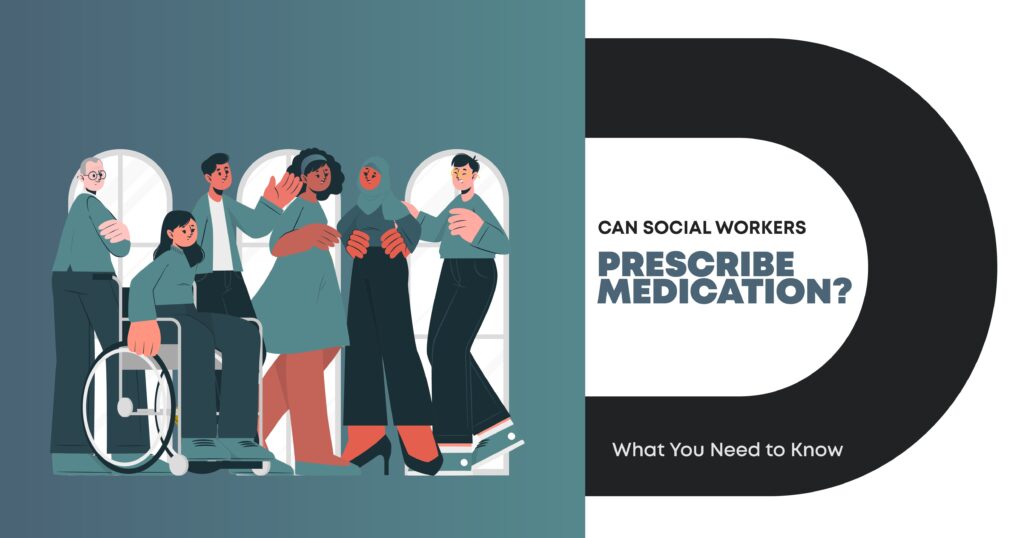Mental health is a wide-reaching field, and it’s made up of many professionals, each bringing something different to the table. Social workers are a vital part of that mix. They guide people through tough emotional moments, offer case support, and advocate for their needs. But here’s a question that comes up pretty often. Can social workers prescribe medication?
The reality is, more than 59 million adults in the U.S. are in some kind of mental health treatment. So it makes sense to want to know who exactly has the legal right to hand out prescriptions. That’s what this article will explain. How social workers fit into the system, how they compare to psychologists and therapists, and what they’re allowed (and not allowed) to do when it comes to medication prescription.
Can Social Workers Prescribe Medication?
Can a licensed clinical social worker prescribe medication? No. Even though LCSWs (Licensed Clinical Social Workers) play a big role in helping people get better, they don’t have the legal authority to prescribe meds. It mostly comes down to one thing: they’re not trained in pharmacology, that’s the science behind how medications interact with the human body.
Instead, social workers work more on the therapy and case management side of things. They’ll help clients create a treatment plan, refer them to professionals like psychiatrists or nurse practitioners (who can prescribe medication), and stay involved throughout the process.
They don’t write prescriptions, but that doesn’t mean they aren’t crucial to the treatment process. They’re often the ones who make sure everything is connected and running smoothly.
Mental Health Center of San Diego
Social Worker Vs Psychologist: What’s the Difference?
Here’s something else people mix up a lot: social worker vs psychologist. They’re not the same.
- Social workers focus on the person as a whole. So if someone is dealing with anxiety but also struggling to pay rent or find a job, a social worker helps with all of it. Not just the mental health aspect.
- Psychologists zero in on diagnosing and treating mental health conditions, using clinical tools and structured therapies.
Let’s look at a side-by-side comparison:
| Aspect | Social Worker (LCSW) | Psychologist |
| Education | Master’s of Social Work (MSW) | Doctorate (PhD or PsyD) |
| Focus | Mental health & social challenges | Mental health assessment, diagnosis, and therapy |
| Mental Health Treatment | Offers counseling and connects people to resources | Diagnoses disorders and provides clinical therapy |
| Ability to Prescribe Medication | No | No |
| Can Diagnose Mental Illness? | Sometimes, depending on state laws | Yes |
| Conducts Psychological Testing? | Occasionally, but limited | Yes |
| Works in Clinical Settings? | Yes – hospitals, agencies, private practice | Yes – clinics, hospitals, research centers |
To keep it simple: social workers deal with a bigger picture, including social and environmental issues, while psychologists are trained to address mental illnesses more narrowly.
Can Therapists or Psychotherapists Prescribe Medication?
This is another common mix-up. Some people assume a therapist can prescribe medication. Not quite. What Is a Therapist? This words is actually a broad term. It includes:
- Licensed professional counselors (LPCs)
- Marriage and family therapists (MFTs)
- Licensed clinical social workers (LCSWs)
- Psychologists
All of these professionals work to support mental health in various ways, through talk therapy, emotional support, recovery planning, etc. Some handle trauma, others focus on relationships, substance abuse, or life coaching.
Who Is a Psychotherapist?
A psychotherapist is a bit more specific. They focus more on the psychological depth of issues. Basically, all psychotherapists are therapists, but not all therapists are psychotherapists. They typically use approaches like:
- Psychoanalysis
- Cognitive-behavioral therapy (CBT)
- Dialectical behavior therapy (DBT)
- Psychodynamic therapy
These methods are more intensive and often used for longer-term mental health challenges. To understand the qualifications and training of therapists and psychotherapists, let’s break it down so it’s clearer:
| Aspect | Therapist | Psychotherapist |
| Education | Usually has a Master’s degree in a related field | May hold a PhD, PsyD, or advanced clinical training |
| Licensing | Passes state exams and does clinical hours | Often requires more advanced credentials |
| Focus | Emotional support, general therapy | Specialized treatment for mental illness |
| Techniques | CBT, mindfulness, interpersonal therapy | More intensive tools like DBT, trauma therapy |
| Prescribing Medication | No | No (unless they have additional medical training) |
| Role in Treatment Plans | Helps build coping skills | Aims for deeper psychological healing |
| Who They Work With | People needing support or guidance | Individuals with complex psychological disorders |
To be clear on the question “Can psychotherapist prescribe medication?” No. Not unless they’ve also got medical credentials. Most can’t, and the law doesn’t allow it.
Even therapists who go through extensive training can’t write prescriptions. Only certain licensed providers can do that. So if you’re wondering who’s actually allowed to give out medication, here’s what you need to know next.
Who Can Legally Prescribe Psychiatric Medication?
Only specific professionals are allowed to legally prescribe medication that treat mental health issues. So when you’re looking for a therapist that can prescribe medication, you’re really looking for someone like:
- Psychiatrists
- Psychiatric Nurse Practitioners (PMHNPs)
- Some Primary Care Physicians
- Prescribing Psychologists (in certain states)
Let’s go through them one at a time.
Psychiatrists (MD, DO)
These are medical doctors who specialize in mental health. They can:
- Diagnose mental illness
- Prescribe and manage psychiatric medication
- Offer therapy in some cases
They’re the most well-known providers of psychiatric medication.
Psychiatric Nurse Practitioners (PMHNPs)
These nurses hold advanced degrees and training in psychiatry. In most states, they:
- Can assess and diagnose mental conditions
- Prescribe meds
- Work independently or with psychiatrists
Some states ask them to work under a psychiatrist when prescribing certain drugs.
Primary Care Doctors
Your family doctor or general practitioner can sometimes prescribe psychiatric drugs, mostly for basic cases of anxiety or depression. If things get more complicated, they’ll refer patients to specialists.
Prescribing Psychologists
In a few states, like New Mexico, Illinois, Iowa, Idaho, and Louisiana, psychologists who receive extra training in pharmacology are allowed to prescribe medication. It’s not common, but it does happen in those places.
How Social Workers Collaborate With Prescribing Providers
Now, just because social workers can’t prescribe medication doesn’t mean they’re out of the loop, far from it. They actually play a major role in connecting clients with the right providers. Let’s explain this.
Mental Health Center of San Diego
Referral and Coordination of Care
Social workers often act as the go-between. If they suspect a client needs medication, they refer them to the right professional. This could be a psychiatrist, PMHNP, or doctor. They help make sure clients don’t get lost in the shuffle.
Monitoring and Advocacy
Even after a client starts medication, the social worker doesn’t disappear. They check in. They make sure the client’s getting the support they need. If the meds aren’t working or if side effects are an issue, they advocate for changes.
Providing Education and Support
Many people don’t understand how medication works, or they’re nervous about it. Social workers help explain what to expect, what side effects might pop up, and how meds fit into the broader recovery plan. It’s about giving clients clarity.
Still Have Questions About Your Care Team? Mental Health Center of San Diego Can Help
Sorting out who does what in mental health care can be overwhelming. But you’re not alone. At Mental Health Center of San Diego, we have professionals – therapists, psychiatrists, social workers. They all work together to get you the best care.
Whether you need someone to talk to, help managing medication, or just answers, we’ve got you. Contact Mental Health Center of San Diego today and we’ll walk you through it.
FAQs
Can social workers prescribe medication?
No. They focus on therapy and referrals. If medication is needed, they’ll send you to someone who can prescribe them.
What is the difference between a social worker and a psychologist?
Social workers handle mental health and life challenges, like housing or employment. Psychologists focus more narrowly on diagnosing and treating mental illnesses.
Can therapists prescribe medication?
Generally, no. Most therapists can’t. You’d need to see a psychiatrist, nurse practitioner, or (in some states) a prescribing psychologist.
Do LCSWs diagnose mental illness?
In some places, yes. It depends on state laws and the worker’s qualifications.
Mental Health Center of San Diego
Who can prescribe psychiatric medication?
Psychiatrists, psychiatric nurse practitioners, primary care doctors, and a few prescribing psychologists in select states. Some physician assistants can, too, if supervised by a doctor.









